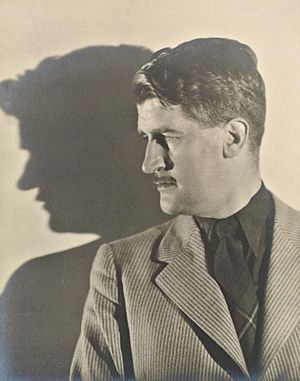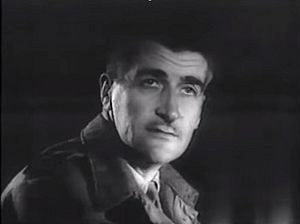Denis Johnston facts for kids
(William) Denis Johnston (born June 18, 1901 – died August 8, 1984) was an Irish writer from Dublin. He is best known for his plays, but he also wrote about literature, a book about Jonathan Swift, a memoir, and even a unique book on the universe and ideas. Denis Johnston also worked as a war correspondent and as a producer for both radio and television at the BBC.
His first play, The Old Lady Says "No!", helped make the Dublin Gate Theatre famous around the world. His second play, The Moon in the Yellow River, was performed globally and featured well-known actors like James Mason and Errol Flynn. Later, he wrote plays about Swift, the 1916 Rebellion in Ireland, the search for fairness, and the fear of death. He also wrote two opera stories and a big public show.
Growing Up
Denis Johnston was the only child of William John Johnston and Kathleen (née King). His father was a lawyer who later became a judge, and his mother was a teacher and singer. His family were Presbyterians and believed in Ireland governing itself. In 1916, during the Easter Rising, rebels actually took over his family home in Dublin.
Johnston went to St Andrew's College, Dublin and Merchiston Castle School in Edinburgh. In 1918, he tried to join Sinn Féin, offering them weapons from his school's army training group. In 1922, while studying history and law at Christ's College, Cambridge, he tried to join the Free State army during the Irish Civil War. He continued his studies at Harvard Law School in the US and later at law schools in Dublin and London.
While in London, Denis Johnston became very interested in theatre. He decided to give up his plans for a career in law and politics to focus on writing.
His Career
Denis Johnston was supported by famous writers like Yeats and Shaw. He also had a complicated friendship with Seán O'Casey. He was a pioneer in early television and war reporting. After working as a lawyer in the 1920s and 30s, he joined the BBC as a writer and producer for radio, and then for the new television service. He wrote original plays for broadcast and adapted works by many different authors.
Johnston strongly believed in freedom of thought and speech. In 1933, he helped start The Secular Society of Ireland with others like John Swift and Mary Manning. This group wanted to make sure people in Ireland had complete freedom to think, speak, and publish their ideas. They believed that everyone should be free to express their minds.
Because of their strong beliefs, the society's meeting place was discovered, and they had to move their meetings to private homes outside Dublin. In 1936, Johnston and the other members closed the society. They gave the money they had to the government of the Spanish Republic, which was fighting for freedom at the time. Johnston was known for his progressive ideas. Even though he was never a member of the Communist Party, he believed in a future where society was more equal until the 1950s.
During the Second World War, he worked as a BBC war correspondent. He reported from important battles like El Alamein and the Italian campaign, and even from places like Buchenwald and Hitler's Berghof. For his brave reporting, he received an OBE, a special mention for his service, and the Yugoslav Partisans Medal. After the war, he became the Director of Programmes for BBC television.
Later, Denis Johnston moved to the United States. He taught at Mount Holyoke College, Smith College, and other universities. He kept detailed diaries throughout his life, which are now kept at the Library of Trinity College, Dublin. These diaries, along with his many articles, give a clear picture of his time and the people he knew. Another collection of his work is at the library of Ulster University at Coleraine. He received special honorary degrees from the University of Ulster and Mount Holyoke College. He was also a member of Aosdána, an Irish group that honors artists.
Denis Johnston had two children with actress Shelah Richards: Jennifer Johnston, who became a respected novelist and playwright, and a son named Micheal. With his second wife, actress Betty Chancellor, he had two more sons, Jeremy and Rory.
What People Thought of His Work
Hilton Edwards, who first directed The Old Lady Says "No!", said that the script "read like a railway guide and played like Tristan and Isolde." This means it looked simple on paper but was very powerful when performed.
When reviewing The Moon in the Yellow River for The New York Times, Brooks Atkinson wrote that Johnston "does not explain; he irradiates." This means Johnston didn't just tell you things, he made them shine with understanding. The play is set in 1927 during an attempt by the IRA to destroy a power plant. A later New York Times review of the play's 1961 revival called it "exhilaratingly mad, comic." However, not everyone in Ireland liked the play.
Johnston's war memoir, Nine Rivers from Jordan, made it onto The New York Times' Best Seller list. It was even mentioned in the World Book Encyclopedia in the 1950s as a recommended book about World War II. A former CBS war correspondent in Vietnam called the book his "Bible," saying he carried it and read it constantly during his time there.
In 1938, the famous playwright Clifford Odets was quoted in The New Yorker saying that the only playwrights he admired were John Howard Lawson, Sean O’Casey, and Denis Johnston.
Today, the Denis Johnston Playwriting Prize is given out every year by the Smith College Department of Theatre. It awards the best play, screenplay, or musical written by a college student in the area. The prize was started by one of his former students at Smith, Carol Sobieski.
His Works
Stage Plays You can find summaries of his plays at Denis Johnston on Irish Playography.
- The Old Lady Says "No!" (1929)
- The Moon in the Yellow River (1931)
- A Bride for the Unicorn (1933)
- Storm Song (1934)
- Blind Man's Buff (1936) (with Ernst Toller)
- The Golden Cuckoo (1939)
- The Dreaming Dust (1940)
- A Fourth for Bridge (1948)
- 'Strange Occurrence on Ireland's Eye' (1956)
- Tain Bo Cuailgne – Pageant of Cuchulainn (1956)
- The Scythe and the Sunset (1958)
Biographies
- In Search of Swift (1959)
- John Millington Synge (Columbia University Press 1965)
Autobiographies
- Nine Rivers from Jordan (1953)
- Orders and Desecrations (1992) (edited by Rory Johnston)
Non-fiction
- The Brazen Horn (1976)
Opera Stories (Libretti)
- Six Characters in Search of an Author (1957)
- Nine Rivers from Jordan (1968)
Stage Adaptations
- Six Characters in Search of an Author (1950) (translated from Pirandello)
- Finnegans Wake (1959) (adapted from Joyce)
Films
- Guests of the Nation (1935) (director)
- Riders to the Sea (1935) (acted the part of Michael)
- Ourselves Alone (1936)
- The True Story of Lilli Marlene (1944)
 | Dorothy Vaughan |
 | Charles Henry Turner |
 | Hildrus Poindexter |
 | Henry Cecil McBay |



